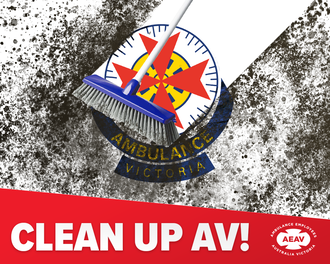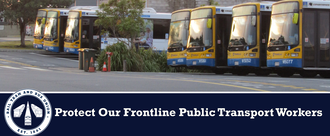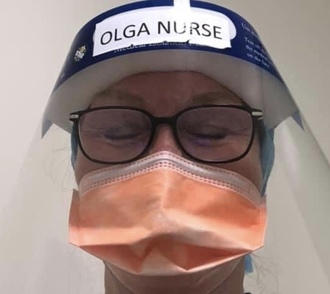- Featured
- Asylum Seekers and Migrants
- Climate and Environmental Justice
- Disability Justice
- Economic Justice
- Education
- First Nations Justice
- Health and Medicare
- International Solidarity
- LGBTIQA+ Rights
- Media and Arts
- Occupational Health and Safety
- Public Services
- Public Transport
- Racial Justice
- Social Justice
- Women's Rights
- Workers' Rights
- More
-
Have a heart for children in state careTHERE'S A CRISIS IN RESIDENTIAL CARE Every month hundreds of shifts are being covered by fatigued Youth Workers working excessive overtime. Many more are not covered at all. The staffing shortage has become so chronic that social workers are now being forced to care for children in offices because there aren't enough Residential Care staff to care for them. This puts vulnerable children and the staff that care for them at serious risk. Minister Sanderson has known about this for years, yet the problem is getting worse. The Public Service Association has calculated that we need at least 60 more full-time youth workers to ensure appropriate staffing in Residential Care. EARLY INTERVENTION PROGRAMS MUST BE RESTORED In the last two State Budgets Minister Sanderson’s government has made significant cuts to successful early intervention programs. As a result we’re seeing more children coming into state care. We need these programs restored to ensure vulnerable children and families are supported to function independently. CUTS TO ABORIGINAL PROGRAMS MUST BE ABANDONED Many children in care are Aboriginal. Yet, Minister Sanderson’s government is planning to axe critical programs specifically designed to support Aboriginal children and their families.898 of 1,000 SignaturesCreated by Nev Kitchin
-
SAY NO TO IN-CAB SURVEILLANCERail companies already have an extensive amount of data available (data Logger/Event recorders, Driver Advice Systems, radio voice recordings, and forward-facing camera) for investigation, compliance and assessments. Adding surveillance inside the cabin of locomotives will not prevent an incident from happening. Better training, support and a “no blame” culture will. We believe that the extended use of in-cab recording devices will have little if any impact on the efficacy of rail safety investigations and will have a significant detrimental effect on the mental health of Traincrew.1,842 of 2,000 SignaturesCreated by Australian Rail, Tram and Bus Union (RTBU)
-
WE DEMAND ACCESS TO OUR FRIENDS AND FAMILYThe WA FIFO Code of Practice clearly lists communication as a critical factor in maintaining the health and wellbeing of FIFO workers. Section 5.5 of the Code states: Access to reliable communications infrastructure is an important factor for managing the impact of remote and isolated work on mental health and wellbeing. Allowing contact with personal networks helps fulfil home-life roles and responsibilities, meet social needs and facilitate the transition between home and work. Where practicable and in line with site requirements, there should be flexibility for workers to contact family and friends during the working day. Where mobile phone coverage is unreliable or inadequate, alternative communication channels (e.g. satellite internet) should be available for personal use and able to cope with periods of high demand.73 of 100 SignaturesCreated by Simon Stokes

-
Provide Ambos with Bullying, Sexual Harassment and Discrimination Investigation ProcessesAmbulance Victoria has received numerous complaints by paramedics about bullying and sexual harassment. They have asked the Victorian Equal Opportunity and Human Rights Commission (VEOHRC) to undertake a review into Sexual Harassment and Discrimination. The review could take years! In the meantime, when paramedics and AV staff raise current issues about bullying, they are told that they can raise them in an internal process or send them to VEOHRC. VEOHRC's coverage of bullying is not clear cut. They cannot conciliate a bullying complaint unless it relates to discrimination or sexual harassment. This will leave many complaints out in the cold, with no-one available to review them. Additionally, less than 10% of surveyed staff at Ambulance Victoria believe that the current internal investigation process is effective and fair. This can’t wait - Ambulance Victoria must act now!307 of 400 SignaturesCreated by Miranda Jamieson
-
Enough is enough. Stop gig workers from being killed on our roads.Delivery riders work night and day for an average of just $10.42 an hour*. They often have to work 50 - 60 hours a week to cobble together a basic income. They have no right to insurance when they get injured or die on the road, and it is at the discretion of huge multinational companies like UberEats and Doordash as to whether their families get supported. A survey conducted by the Transport Workers Union in September found that 73% of food delivery riders are worried about being ‘seriously hurt or killed’ at work. And their fears are clearly not unfounded. The Federal government must step up and take responsibility for workers being killed on the job by pulling these cowboy companies into line.6,688 of 7,000 SignaturesCreated by Transport Workers Union and Young Workers Centre
-
Don't Leave Public Transport Workers At the End of the Queue For The Covid VaccinePublic transport workers in Australia deal with millions of Australians getting them to work, school and play. This puts them at a heightened risk of contracting and spreading Covid-19. For many Governments, public transport workers are an afterthought. However, with this crisis, we need Governments of all levels to prioritise providing free and easy access to the new Covid-19 vaccine before big business and greedy CEOs get their hands on it. Public transport workers keep Australia moving and we can't let them be left at the back of the queue. #DontForgetPTWorkers #Covid19 #FrontlineHeros108 of 200 SignaturesCreated by Australian Rail, Tram and Bus Union (RTBU)
-
Ratify ILO C190 Violence and Harassment Convention now!This Convention is ground-breaking for many reasons, including that it: • Protects against all forms of violence and harassment in the world of work, including during commuting to and from work, and through information and communications technologies; • Protects all individuals in the world of work, irrespective of their contractual status, including volunteers, trainees and apprentices, and casuals; • Recognises that family and domestic violence is a workplace issue and sets out specific measures that can be taken to protect workers; • Recognises that workers in some sectors, such as health, transport, education, retail and hospitality, or those working at night or in isolated areas, may be more exposed to violence and harassment and need special protections. Although violence and harassment in the workplace can be suffered by any worker, women are much more vulnerable to it and much more likely to experience it. These risks of violence and harassment have become more pronounced during the pandemic. Rates of domestic and family violence have spiked around the world in 2020, and large numbers of workers are being required to work from home, regardless of whether it’s a safe work environment for them. Please tell the Attorney-General and Minister for Women to urgently commit to ratify C 190 to make workplaces healthy, safe and respectful for all of us.262 of 300 SignaturesCreated by Construction Forestry Maritime Mining and Energy Union

-
No COVID-19 testing in community pharmacyPharmacy patients are some of the most vulnerable people in our community – people with complex medication needs, people with multiple health issues, and the elderly who rely on medication for chronic illness and conditions. Pharmacies are primarily retail and health spaces that are not designed to be communicable disease testing centres. People who have respiratory symptoms including those with cold and flu symptoms should be tested at a predesignated testing sites and then stay home, not go to a community pharmacy. We’ve seen that even with highly trained medical staff adhering to strict infectious disease protocols, COVID-19 has successfully infected large numbers of health workers. The plan by the Queensland government to make every pharmacy in the state a Covid-19 testing centre is reckless and puts the health and safety of pharmacy employees and the community they serve at risk.538 of 600 SignaturesCreated by Paul Inglis
-
UTAS REVERSE CUTS TO CLEANERSThe COVID-19 pandemic has shown the importance of cleaners and the amazing job they do in keeping work spaces and public areas clean, healthy, and sanitary. During the pandemic, cleaners have been put under immense stress as they fight to keep Tasmanians safe. It is because of the hard work and dedication of cleaners that Tasmania currently has zero recorded cases of COVID-19. However, we are only as safe as our front line defence allows us to be. By cutting the cleaning budget, effectively withdrawing time and resources from cleaners to do their job, UTAS is putting everyone at risk. It would be devastating if a second wave of COVID-19 spread throughout Tasmania because of this poor decision by Vice-Chancellor Rufus Black and the UTAS Board. UTAS must restore its cleaning budget NOW!182 of 200 SignaturesCreated by Ben Dudman

-
Support LGBTIQ+ kids, stop Mark Latham's Bill!Mark Latham's Education Legislation Amendment (Parental Rights) Bill 2020 is a dangerous attack to LGBTIQ+ kids and staff. If passed, the Bill will: -prohibit trans and gender diverse content being taught in health and physical education classes. - prohibit teachers from mentioning the existence of LGBTI+ characters, people or events in other subjects like English or History. - prohibit counsellors from giving advice to students on the subject of gender fluidity. - force teachers to refuse to call students by their preferred pronouns. - teachers who do not comply could lose their accreditation and their jobs. - allow parents and guardians to remove their child from any course that mentions sexuality. - force schools to consult with parents and guardians at the start of each year about any course which mentions sexuality (and change the courses accordingly). - legitimise the stigmatization of intersex students. This Bill goes further even than the Religious Discrimination Bill that the Morrison government has waiting in the shadows - which itself would legalise discrimination towards LGBTI+ people in Australia. Latham's Bill goes further as a calculated attempt to erase the very existence of LGBTI+ people and force kids and staff back into the closet. Please share this petition to keep up the fight!3,928 of 4,000 SignaturesCreated by CARR (Community Action for Rainbow Rights)
-
Mandate N95 fit testing for health workersHealth care workers are at high occupational risk of contracting COVID-19, and are overrepresented in serious cases. Preventative measures, including provision of and education about the use of personal protective equipment, is only effective if it is fit for purpose - masks that allow unfiltered air entry and exit exposes health care workers, their colleagues, family members, and care recipients to increased risk.252 of 300 SignaturesCreated by Tara Nipe
-
Stop the Toxic FiresThe slap-on-the-wrist fines that these companies get are not enough. Dodgy companies that cut corners and put their workers, the community and the environment at risk should lose their operating licences and be closed. These fires have deadly consequences and we need urgent action to hold these corporate criminals to account.6 of 100 SignaturesCreated by Chris Giddings





.png)






